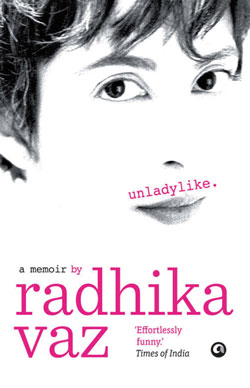 Gender bender
Gender bender
Published by: Aleph Book Company
ISBN: 9789383064175
Pages: 214
Price: INR 299
Radhika Vaz dedicates her memoir Unladylike to “All the unladies out there who refuse to be bound by the rules of femininity.” A new category of women has been announced; one which is unconventional, honest and thus powerful. The book becomes not just an exercise in retrospection for the author but an invitation extended to the female readers to re-examine all expectations laid on women.
Calling this a coming-of-age story would be forcing it to wear such a serious robe as would suit neither the book’s effortless humour nor its author. But, if it wasn’t that wherefrom stem the bouquet of lessons, learnt and unlearnt, which fill the book to the brim? Echoing right after the comedian’s sassy voice is a 40-year-old woman’s voice, mapping her journey of not just growing up but also growing towards freedom of self. From a schoolgirl trying to belong to a woman struggling to “un-belong”, the story follows a neat chronology of “becoming”.
We meet Radhika as a five-year-old who feels like an “unknown polyester brand”, neither belonging to one community nor to the dominant culture of her friends. She also does not fit the conventional idea of beauty. Thus, “all I ever wanted from that point was to be on the inside”, even if it meant wearing a head scarf in Baghdad! In her teens she was “secretly suspicious of her gender”, with her delayed periods, luxuriant body hair and flat chest. Ideas of sexuality and body find prominence in this hosteller’s life, and her “obvious inadequacies” followed her everywhere, enough to make her secretly try on her mother’s bras because it felt “oh so grown-up!” Socials with boys were looked forward to but romance was considered wrong. She wondered why girls couldn’t propose boys, were forced to play “hard to get” and “be mysterious”, while boys had all the fun and freedom? At the cusp of adulthood she saw the unfairness of attaching value to virginity, and labels like “fast-chicks”. By the “roaring twenties” this observing, questioning rebel was ready!
Accused of an inability to apply herself, to conform to academic or gender standards, Radhika started walking a different line. As a working woman she first “negotiated singledom” only to chase a man to the US, live-together “as man and something” and get married her way too! The imperativeness of motherhood as a logical next-step to marriage to prove a woman’s worth is amusingly yet powerfully rejected in the final chapters.
It is noticeable how Radhika Vaz doesn’t come from a typical Indian family. With parents who were much ahead of their times letting her hold her reins most of her life, Radhika’s brand of feminism had few battles of deprivation or denial to fight. Her memoir makes no attempt to colour that, and she makes no attempt to not reject conventions which she believes in, even. Thus, ultimately, she finds a balance in her life by making conscious choices at every phase.
With this honesty and balance, she invites you to view your own life as you view hers; an exchange of perspectives on having to adapt to changing context—emotionally, physically and socially. Lessons on relationships emerge as Radhika wonders why Indian daughters hide things from their parents. Evident is the essentiality to challenge being shamed as a “badly behaved, of inferior intellect, boy crazy” girl and be aware that social expectations from men and women are “inherently antithetical”. The book asks women to never let their pride levels fall to “negative numbers” and to be strong, because being honest needs strength to stomach the consequences. “Spread the idea that the unknown is fun… find something, anything, which has nothing to do with how you look or how old you are” and do it! And with a flourish “The Baby Question’ wonderfully sums up the pressures applied on women’s psychologies to become mothers, to prove you are a woman and a good person. But the truth of it all is that “when you want to do something that isn’t the ‘norm’ you will be made to feel like you have a problem and if you hear it often enough then you start to believe it too”. Unladylike asks you not to believe that and instead believe in yourself!
A must-read for the ladies, gents and ‘unladies’!

